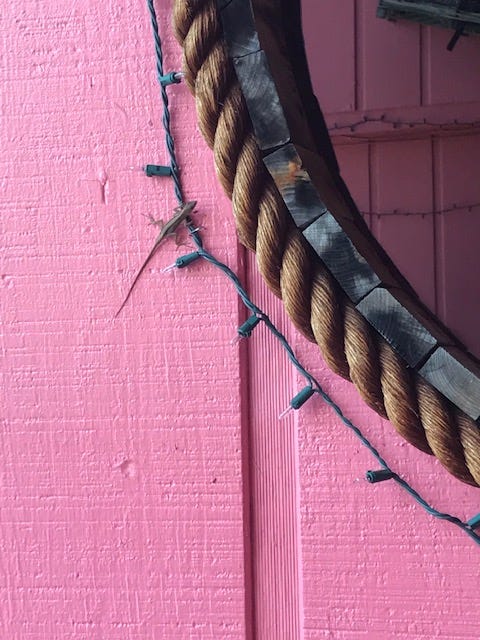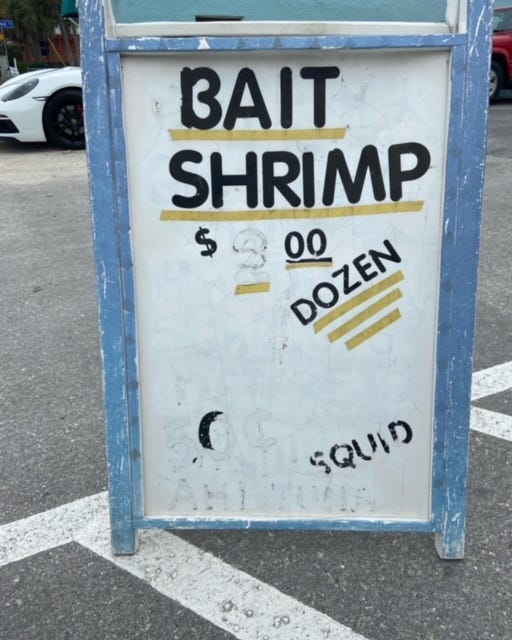Last time: The Saddest Songs Are the Ones She Loved (for paid subscribers)
“No place works any different than any other place, really, beyond mere details. The universal human laws--need, love for the beloved, fear, hunger, periodic exaltation, the kindness that rises up naturally in the absence of hunger/fear/pain--are constant, predictable, reliable, universal, and are merely ornamented with the details of local culture.” -George Saunders, The Braindead Megaphone
The news has not been good after Hurricane Ian. For some of the places I love most, the place I convinced my parents to move to, the news is devastating. I say this even though I now know my parents are safe and I say this, that I am heartbroken, even though my memories of southwest Florida are still in tact.
The devastation to areas like Matlacha and Pine Island, Sanibel and Captiva Island, Cape Coral and Fort Myers, is beyond what we can comprehend. And we don’t even have the full details yet, largely because people can’t get into these areas to document the catastrophe.
The people are who matter most and that is where rescue efforts are currently focused, as they should be. My favorite custard shop being washed away shouldn’t matter. The book store my son (and my whole family) loves being under water isn’t what I should worry about.
And yet.
Over the past week, as I can’t stop looking at the wreckage, I’ve been reminded of a writing prompt I used to enjoy giving to my creative writing students. I’ll include it below, but here’s the short version:
Destroy the Place You Love Most.
I ask students to write about their favorite place, their happy place if you will, and then, once they’re smiling at all the warm, fuzzy memories, I tell them to destroy it. Destroy the place, not the writing. Write about the worst thing that could happen there.
It’s always one of the hardest prompts for them to finish. They hate me for it. But then, it’s also some of the best writing they share during the whole semester. I suspect the writing is so strong for them because they really care. They are so invested in this one place instead of inventing a vague everytown setting, that they know they have to do it justice even in its destruction.
The destruction on the page only feels tolerable when there is distance, whether by time or reality.
And like every fiction writer knows, it’s easy to be a masochist when there are only words on a page. It’s different when the words and images are real.
Other updates:
I had a birthday. My parents, in the middle of a hurricane, before the power went down completely, called to sing Happy Birthday. A friend treated me to a taco lunch. My husband and son took me out to dinner and then stuck a candle in a Fig Newton. It was a hard day, but full of love, always.
I’m in hibernation mode for the month of October. That means I’m revising morning, noon, and night (except for, you know, my job and swim practice, etc.). Hibernation also means saying no to social events. So…not much has changed there.
I finished five books in September, including the awesomely propulsive-for-a 1,000-page-biography, Red Comet by Heather Clark. Read about my other September reads over on Medium.
I’m currently reading:
Lord of the Flies by William Golding (I’ve never read it before!)
Note: I am a Bookshop.org affiliate and may earn a small commission if you purchase through any of my book links.
Writing Prompt: Destroy the Place You Love Most
Write about your favorite place (or a place you used to spend a lot of time) in as much detail as possible. Get really deep in the sensory description. This is your happy place. Keep writing until you can see and smell and hear it, and then write some more to make sure a prospective reader could see and smell and hear this place, too.
Hit enter or flip the page.
Now, try to write about the destruction of this place. Destroy it on the page. It doesn’t matter how (fire, hurricane, bomb, neglect, etc.), but visualize the destruction completely.
What does that place look like now? What emotions come to the surface? This part should be much harder, even heartbreaking, to imagine. However, if your heart is still cold and surrounded by barbed wire, go deeper. Keep writing.
Please allow me to make a pitch for becoming a paid subscriber:
There are no ads on Substack, so all support comes from writer subscriptions. As the wonderful Summer Brennan says, “All writing costs money to produce in the form of time, food, electricity, a laptop, a roof over my head, my student loans that I’ll be paying off until I die, my health insurance so I don’t wither away…”
Your subscription will help make sure I can keep writing and publishing all year round.
Thank you in advance.









This is a great writing prompt, and a wonderful tribute to the places you've lost. And this: "The destruction on the page only feels tolerable when there is distance, whether by time or reality." -- well, keep it in mind when you read Know My Name. Distance is necessary. And all of it is hard. Sending hugs.